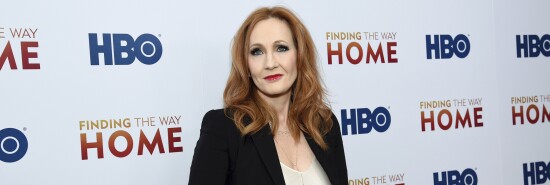
Why JK Rowling — and audiences — deserves another Harry Potter adaptation
Tiana Lowe
Video Embed
In a landmark decision from the new conglomerate of Warner Bros. Discovery, the bestselling book series of all time is getting a second shot on camera. The Harry Potter saga, which Warner Bros. previously produced into the fourth-highest-grossing film series, will become a “faithful” decadelong series for HBO Max (soon to be stupidly shortened to just “Max”).
Naturally, television critics excoriated HBO’s decision to order the series because author J.K. Rowling will serve as executive producer.
WHAT’S THE DIFFERENCE BETWEEN DIANNE FEINSTEIN AND JOHN FETTERMAN
“This faithful adaptation of harry potter, announced with absolutely bulls*** craven disdain for rowling’s political impact, is bad,” wrote Vulture’s Kathryn VanArendonk, while Sean T. Collins branded Rowling the leader of a “hate group.”
Not that Rowling’s detractors — who, recall, hate her because she doesn’t want convicted rapists in women’s rape shelters — care about the substance of their objections. But Rowling, the first author alive to become a billionaire from her craft, deserves a second chance at adapting her series if only because we, the audience, will absolutely adore it.
When the original Harry Potter books were picked up for adaptation, film was the only possible medium. But at last, HBO created prestige television with the launch of The Sopranos and Six Feet Under and then perfected the medium for fantasy with Game of Thrones and House of the Dragon. While film made sense for the Harry Potter franchise in 2001, movies necessarily compress time, details, and, most importantly, world building and supporting character development.
It’s not as though the original film series wasn’t near perfectly cast, acted, and edited, but rather, audiences ached to dig a little deeper and a little wilder. Some may consider matching the phenomenal three actors at the center of the film series like catching lighting in a bottle, but the best stories in the English language are meant to transcend time and the faces behind legendary characters. (See: Shakespeare, the King James Bible.)
Let us consider those wonderful assets of prestige TV, fully fleshed-out supporting characters and world building. Supporting characters brought to the foreground or given significant subplots — for example, Ginny becoming a crucial ally of Harry in the fifth book and Tonks’s secret romance with Lupin — are relegated to mere background players in the films. Part of this, at the time, was due to the constraints of movie filming schedules and salaries. But HBO in particular excels at using supporting characters, especially when the stakes of a story need to feel larger than life (such as Harry needing to save the entire wizarding world). A television series lends itself to a lot more consistent casting, meaning plots and characters won’t be randomly missing because of scheduling conflicts.
The original films also skimp over the flashback Pensieve scenes, which not only teach Harry about his parents but also forewarn the audience about whether or not Snape is really a villain. Take a chapter from the fifth book that is barely depicted in the movie. In “Snape’s Worst Memory,” Harry views Snape’s memory of Harry’s father, James, bullying him back in high school and then Snape calling Harry’s mother, Lily, a “mudblood.” (This is the wizard equivalent of the N-word.)
Then, when Harry discovers at the end of the series that Snape was in love with Lily all along, this memory is made all the more painful; it wasn’t James’s bullying that made it so painful for Snape but rather that saying that slur is when Snape lost Lily forever.
The Harry Potter movies will forever be cherished as some of the finest fantasy films ever made and especially the cast remembered as one of the best ensembles. But Rowling deserves another bite at the apple, and nobody should deny the fact that we’re all ready to reimagine the generation-definition saga of the Boy Who Lived.
